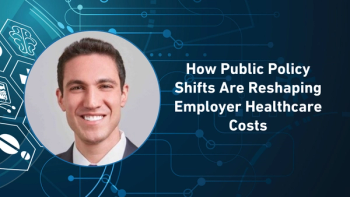
- Pharmaceutical Commerce - October 2023
- Volume 18
- Issue 5
Affordability: Who's Responsible?
The debate continues as to how government payers should weigh covering healthcare needs versus other budget items.
Advances in technology, aging of populations, and unhealthy lifestyles have contributed to rapidly rising healthcare costs. Healthcare affordability is a large issue for governments, insurers, employers, and patients today, but there is concern that it could become a much bigger issue tomorrow. How do we deal with that?
Cardiovascular diseases and cancer have a large impact on patient lives. New technological solutions have helped to alleviate the humanistic burden but have also increased the healthcare bill. Many unmet needs remain in almost all therapy areas. Technical advances will likely produce new medical and pharmaceutical solutions that will come with tough budget choices. How should government payers choose between covering increasing healthcare necessities and needs for the other two largest US budget items, social security and defense? Let’s consider two disease areas with different challenges.
Alzheimer's disease
Without any effective interventions, Alzheimer’s disease alone, it's been reported, can
Obesity
Recent evidence of the weight loss and cardiovascular health benefits of Ozempic and Wegovy have garnered plenty of social media attention and hype. With
fundamental questions for our society and the industry. Will we get to a point where most of the population takes drugs to control weight for the rest of their lives, and should we work harder to encourage maintaining a healthy food chain and lifestyle?
Insurance coverage
Which healthcare innovations should be covered by government and private health insurance? Should health insurance premiums vary depending on body mass index, fitness, or even gene map? That raises many ethical and fairness questions, particularly since some of these factors are beyond our individual control. As the government shoulders a large proportion of healthcare costs, how should it choose between covering increasing healthcare necessities and needs in the other two largest US budget items, social security and defense?
Biopharma industry's role
Narrowly focusing on drugs as a solution to weight problems opens up concern as to what the role of weight loss drugs should be, for which populations, and how it fits with tighter control of our food chain, personal lifestyle responsibilities, and interventions such as bariatric surgery. This question can only be solved by a tighter collaboration between the pharma sector, medical community, FDA, and the health insurance industry.
About the Author
Ed Schoonveld is a value and access consultant, and author of The Price of Global Health.
Articles in this issue
over 2 years ago
Pharmaceutical Commerce - October 2023 Issue (PDF)over 2 years ago
Taking Pharma's Temperatureover 2 years ago
All About the Journeyover 2 years ago
Drilling Down On Distributionover 2 years ago
Time to Ax Copay Accumulators?over 2 years ago
Return of Cash Pay for Drugsover 2 years ago
The State of the Pharma Cold Chainover 2 years ago
Reshaped Priorities Pave Cold Chain Pathover 2 years ago
Counterfeit Meds: Fighting the Forgersover 2 years ago
Fortifying Vaccine Supply ChainsNewsletter
Stay ahead in the life sciences industry with Pharmaceutical Commerce, the latest news, trends, and strategies in drug distribution, commercialization, and market access.




